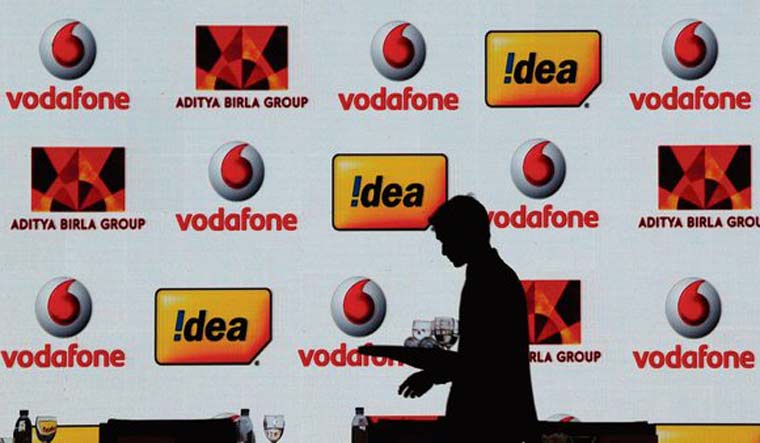In a decision that will have a far-reaching impact on Indian telecom, the Supreme Court on Tuesday allowed operators to pay up their aggregated gross revenue (AGR) dues in a staggered manner over a period of 10 years. The three-judge bench of Justices Arun Mishra, S.Abdul Nazeer and M.R. Shah also ruled that payments have to be done over a 10-year period starting April 2021, till 2031, the apex court ruled. Ten per cent has to be paid upfront. Any default would be punishable by contempt of court, beside interest and penalty.
The judgment was keenly awaited as the fate of Vodafone-Idea hinged on it. There were worries that a stringent judgment from the court might force Vodafone-Idea to shut down its service, leading to a duopoly of just Mukesh Ambani's Reliance Jio and Sunil Mittal's Bharti Airtel, an outcome considered undesirable for consumer choice. Vodafone Idea has a staggering balance of Rs 50,399 crore, while Airtel's balance is Rs 25,976 crore, according to solicitor general Tushar Mehta.
After attempts at a resolution and review failed, with the court adamant that the AGR dues had to be paid, operators like Vodafone had pleaded for a staggered payment schedule—their first request was for a 20-year time table, which was later reduced to 15 years. In its last hearing, SC had reserved its order.
In its filings to the stock exchanges after posting another record loss in the April-June quarter, Vodafone-Idea had said, “Our ability to continue as going concern is essentially dependent on a positive outcome with regard to the timeframe for payment of AGR dues in instalments and successful negotiations with lenders.”
Even with Tuesday's judgment, it remains to be seen how the promoters will pivot Vodafone-Idea to take on the huge expense and still remain viable. It had posted record losses of more than Rs 25,000 crore in the April-June quarter this year. Many analysts think it will be an uphill task, even if the company raises call and data rates, and goes to the market for raising funds.
Vodafone-Idea, once India's largest telephone service provider, was the hardest hit from the Supreme Court's aggregated gross revenue (AGR) verdict last October, which ordered telecom service providers to pay up huge amounts due to the government. The total AGR due has been estimated at upward of Rs 3 lakh crore.
Among existing players, Vodafone-Idea was left with the biggest due, estimated to be around Rs 58,000 crore. Being a late entrant, Jio got off easy with just Rs 195 crore AGR due, which it paid up within the SC's initial three month deadline. Rival Airtel, saddled with a Rs 44,000 crore AGR due, has managed to pay more than half, besides going in for a stream of fundraising and expansion plans. About Rs 40,000 crore is due from companies that have gone insolvent, like Anil Ambani's Reliance Communications and Aircel.
Facing record losses, falling revenue, fleeing subscribers and a price war unleashed on the sector since Reliance Jio came in a few years ago, Vodafone-Idea has so far paid up just Rs 7,900 crore out of its Rs 58,000 crore due. While attempts at 'self-auditing' of the actual figure owned, followed by the government itself trying to help out the operators by making some half-baked attempts, the courts had cracked down in previous hearings, saying the amount has to be paid and that was the end of it. This left the beleaguered company with only one option—to plead for a staggered schedule for repayment, stretching 15 years (though its first request was for a 20-year repayment period).
AGR issue has its origin in the late nineties when the government had started giving out licenses and spectrum to private telecom players. Many firms grabbed licenses bidding big sums, and then turned around later claiming it was hard to pay up. To sort it out, the government gave them the option to migrate to a revenue-sharing model, where the operators had to pay 8 per cent of their total, or 'aggregated', revenue as license fee and 3 to 5 per cent as spectrum usage charges. The problem cropped up when the telecom operators argued that AGR should be calculated on income from telecom service only, while the government's stand was that AGR should include income from everything, from dividend and interest to income from investments and even sale of assets of these companies. The case went to the courts, dragging through TDSAT to lower courts, until the SC settled the issue in favour of the government last year, that AGR includes all income and that the humongous amount due, piling up over all the years as the case dragged on, should be paid up.
India's telephony sector presently has three leading players—Jio, Airtel and Vodafone-Idea (a joint-venture led by Kumarmangalam Birla's Aditya Birla group). Birla has been quoted more than once that he might rather shut down his telecom business rather than be debilitated by paying up the massive dues.



